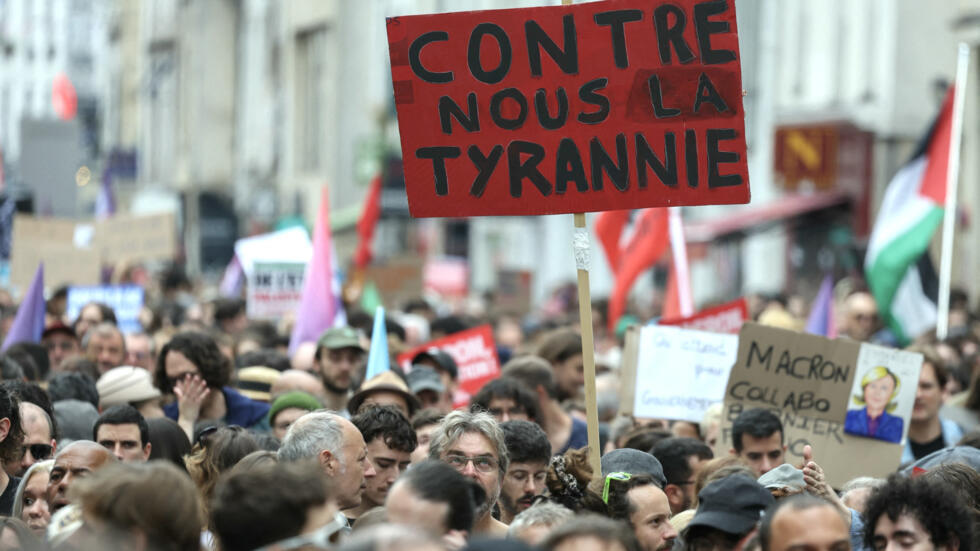
On September 7, local time, large-scale protest demonstrations broke out in many places in France, according to incomplete statistics, the number of participants was as high as 110,000 people, the core of the protest tide directly pointed to the appointment of French President Macron to the new Prime Minister Barnier decision, left-wing parties and their supporters have taken to the streets, Shouting "Macron down!" "France is collapsing! "To express discontent and anger at government decisions.
The background of the protest came after French President Emmanuel Macron unexpectedly appointed the centre-right Republican Barnier as the new French prime minister 60 days after the snap parliamentary elections, instead of following the nomination of the new left-wing coalition New People's Front (NFP), the largest force in the new Congress. The decision sparked an immediate backlash in France, especially on the left, which accused Macron of flouting the election result and trampling on democratic principles.
The protests were echoed by left-wing party leaders, trade unions, student groups and a large number of left-wing supporters, who staged large-scale demonstrations in major cities such as Paris, Nantes, Nice, Marseille and Strasbourg. In Paris, demonstrators marched from the symbolic Bastille prison, carrying flags and placards, chanting "stolen elections" and "Macron for power" in an outpouring of anger and frustration. Although the exact numbers vary, according to official statistics from the French Interior Ministry, there is no denying that the protests have had a wide impact across the country, highlighting the deep divisions in French society over government decisions.
The core issue of the protest is that the left camp believes that Macron failed to respect the election result and forced the appointment of a right-wing prime minister, which will undoubtedly exacerbate the division and antagonism of French society. Leftist leader Melenchon was even more fierce in the march, he called for the people to fight for a long time, saying that "the French are rebelling and have begun a revolution," which undoubtedly added a stronger political tone to the protests.
At the same time, polling data also reflect the French public's widespread dissatisfaction with the appointment. According to a survey published by pollster Elabe, a whopping 74 percent of respondents believe Macron did not respect the election result, while 55 percent accused him of "stealing" the election. This data not only reveals strong discontent with government decisions, but also foreshadows the complexity and uncertainty of France's political ecology.
However, in the face of rising protests, the new Prime Minister Barnier did not choose to remain silent. Early in his term, he expressed a willingness to work with the left and stressed the importance of public service. While he made clear he would press ahead with the Macron government's reform policies, including raising the retirement age, he also promised to adapt policies to better protect the vulnerable. This has eased some social tensions to some extent, but it has also raised questions about whether it can find a balance between left and right to successfully push through the reform process.
In the face of strong opposition from the left and widespread skepticism from the public, Macron's government faces unprecedented challenges. On the one hand, the government needs to maintain its own authority and legitimacy to ensure the smooth implementation of policies. On the other hand, it is also necessary to listen to the voices of the people and seek a broader social consensus. In this political storm, how to balance the interests of all parties, resolve social contradictions, and promote the development of French society will become an urgent problem for the Macron government to solve.
Moreover, it is worth noting that the complexity of France's political ecology also adds more variables to the protests. The New People's Front and the National Alliance share a majority of seats in parliament, and cooperation or split between them will directly affect the stability of the government and the direction of policy. Therefore, in the coming period of time, the development of the political situation in France will remain full of uncertainty, and the game between various forces will continue.
The protests triggered by the appointment of a new prime minister in France are not only a direct challenge to the government's decision-making, but also a profound reflection on the political ecology, social structure and even the democratic system of France. In this storm, how the forces of French society will act and how the government will respond will have a profound impact on the political pattern of France and even Europe.

Driven by the Trump administration's push to relax financial regulations and the recovery of investment banking business, the market value of the six major banks in the United States has cumulatively increased by approximately 600 billion US dollars by 2025.
Driven by the Trump administration's push to relax financia…
On Christmas evening, U.S. President Trump posted on social…
According to multiple foreign media reports, the recent fin…
The middle class, once regarded as the cornerstone of Ameri…
On December 19th local time, the US military launched a lar…
The Boxing Day sunshine should have cast a false glow of pr…